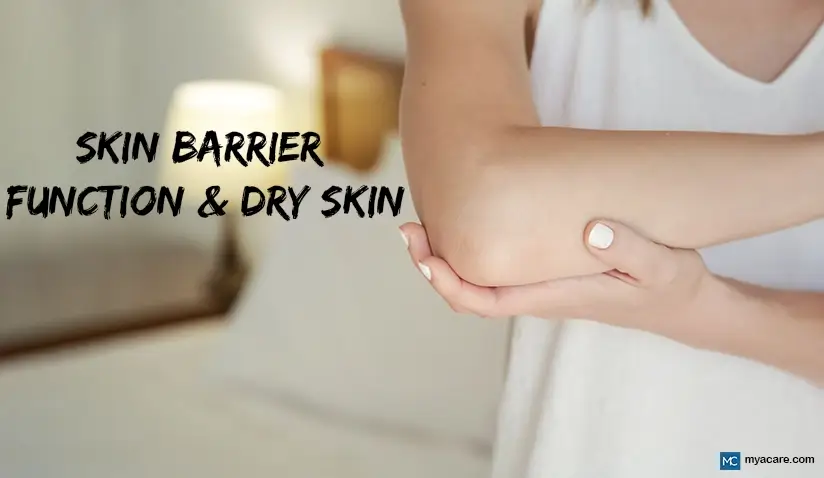The Importance of Skin Barrier Function in the Treatment of Dry Skin

Medically Reviewed by Dr. Rosmy Barrios - August 2, 2024
What is Skin Barrier Function?
How Skin Barrier Function is Regulated
Dry skin is a widely prevalent condition affecting many people, especially in cold and dry climates. It can cause itching, flaking, cracking, and inflammation or redness of the skin, as well as increase the risk of infections and skin diseases. Dry skin can also affect one’s appearance and self-esteem, making them feel uncomfortable and less confident.
A lot of people want to know what causes dry skin and how it can be treated. The answer lies in understanding the role of skin barrier function in maintaining skin health, hydration and vitality. Through the course of this article, the importance of skin barrier function will be explored alongside skincare secrets to keeping a perfect complexion.
What is Skin Barrier Function?
The outermost layer of the skin is termed stratum corneum, i.e., the skin barrier. Unlike the other layers of the skin, the stratum corneum consists of dead skin cells known as corneocytes. Corneocytes are embedded in a lipid matrix comprising ceramides, cholesterol, and free fatty acids. These lipids help maintain hydration by reducing water loss that keeps the skin moist and supple. They are also filled with a protein called keratin, which makes them tough and waterproof, further enhancing skin barrier function.[1]
The stratum corneum, as the primary barrier between the body and the environment, serves to prevent water loss and shield the skin from external elements such as bacteria, allergens, chemicals, and UV rays. It constantly sheds and renews itself as new cells develop in the deeper layers of the skin.
How Skin Barrier Function is Regulated
Skin barrier function is kept in proper shape by several factors, including:
The Skin Microbiome. The microbiome is one of many factors influencing skin barrier function. Like the gut, the skin’s barrier houses a diverse blend of beneficial microbes that usually keep the skin free of pathogens. Occasionally, these get out of hand and give rise to acne or skin infections.
Skin pH. The skin’s pH helps to keep the barrier and its microbiome balanced when maintained at around 5.5. The pH level also helps to activate certain enzymes that regulate skin barrier renewal by producing new skin cells and promoting the shedding of dead skin cells.
Skin Protein Production. Skin barrier function is influenced by genetic factors, such as the presence or absence of certain proteins that are involved in its formation and maintenance. One of these proteins is filaggrin, which helps aggregate keratin filaments in the corneocytes and break them down into natural moisturizing factors that hydrate the skin. People who have a filaggrin deficiency are more prone to reduced skin barrier function, dry skin and eczema, which is a chronic inflammatory skin condition characterized by redness, itching, and scaling.[2]
Causes and Risk Factors - How Does Skin Barrier Damage Lead to Dry Skin?
When skin barrier function is compromised, it increases transepidermal water loss (TEWL), which is the amount of water that evaporates from the skin surface. This causes dryness and dehydration of the skin cells. It also makes the skin more vulnerable to external factors that can further damage it or cause infections and inflammation. Signs of skin barrier damage are reflected in dry skin, including skin tightness, flaking, cracking and inflammation.
The following factors can cause skin barrier damage and increase the risk of dry skin:
- Harsh Weather. Exposure to harsh weather conditions, such as cold, dry, or windy air, can strip away the natural oils from the skin and disrupt its lipid matrix.
- Too Much Sun or Heat. Excess sun or artificial heating can dehydrate the skin and cause it to become directly burnt or passively inflamed.
- Chemical Exposure. Contact with irritants or allergens, such as detergents, perfumes, cosmetics, or metals, can trigger inflammation and damage skin cells.
- Skin Abrasion. Overwashing or scrubbing the skin can remove its natural oils and disrupt its lipid matrix. Using harsh or unsuitable products can also alter its pH level or cause irritation.
- Lifestyle Factors. Poor diet, smoking, alcohol consumption, stress, or lack of sleep can also impair skin barrier function by affecting its blood supply or nutrient delivery.
- Aging. Older individuals are prone to dry skin more on average. This is due to a lifetime accumulation of faulty cells as well as sun exposure and other risk factors. Aged skin is also known to be deficient in filaggrin, healthy collagen and other important proteins that support skin barrier function.
- Medical Conditions. Certain diseases or disorders can affect skin barrier function. Examples include psoriasis, atopic dermatitis, seborrheic dermatitis, ichthyosis, xerosis, diabetes, thyroid problems, or kidney failure. These conditions can alter the structure or composition of the stratum corneum or affect its hydration and pH.
Dry Skin Treatment and Prevention
The prevention of dry skin is based on maintaining healthy skin barrier function and avoiding factors that can damage it. The treatment of dry skin tends to work on similar principles, yet depends on its severity and the underlying causes.
Some general steps that can help to prevent and treat dry skin are discussed below.
Follow a Gentle and Consistent Skincare Routine
Use a mild cleanser that does not strip away the skin's natural oils to cleanse your skin twice daily. Exfoliate once or twice a week with a gentle scrub or chemical exfoliant that removes dead skin cells and improves skin texture. Tone your skin with a pH-balancing toner that restores its acidity and prepares it for moisturization. Moisturize your skin with a product that suits your skin type and needs. Use a serum or an eye cream for extra hydration or treatment of specific concerns.
Use Gentle Skincare Products
Choose products suited to your skin type or condition and which contain ingredients that can hydrate the skin and strengthen or repair skin barrier function. Examples include:
- Colloidal oatmeal, which has anti-inflammatory and soothing properties
- Ceramides, which replenish the lipid matrix
- Cholesterol that stabilizes the lipid matrix
- Free fatty acids that restore pH
- Hyaluronic acid for skin hydration
- Urea, which exfoliates and moisturizes
- Niacinamide to reduce inflammation and improve barrier function
- Antioxidants that protect against oxidative stress and inflammation
These ingredients are known to help repair the skin’s lipid matrix, restore the pH level, reduce inflammation, and protect against oxidative stress.
Avoid products that contain alcohol, fragrances, colorants, preservatives, or chemical exfoliants that can irritate or dry out your skin. Also, be aware that many products contain bases, such as glycerine, that, while hydrating, can cause skin irritation when not balanced by other soothing ingredients.[3] Opt for products that contain a variety of skin-protective ingredients, and you’re good to go!
Seek advice from your doctor to decide whether a topical steroid is a viable option for managing your skin condition and to determine the most suitable potency and treatment duration for your individual needs.
Consult a Skincare Specialist
For specific skin conditions, such as eczema, psoriasis or dermatitis, or severely dry skin, you ought to consult with a dermatologist. They can explain which products you can use on your skin and if any other prescriptions may be necessary to treat the condition and prevent flare-ups.
Apply Moisturizers Regularly
Moisturizers help to lock in moisture and prevent your skin from losing water. You can apply them within a few minutes after bathing or washing your face when your skin is still damp. Use a thicker cream or ointment for very dry areas or during the winter months. Reapply as needed throughout the day, especially after exposure to sun or wind. Be careful not to over-apply moisturizer and cause your skin to become exceedingly oily, as this can lead to acne.
Protect the Skin from Sun Exposure
Sun exposure can damage skin barrier function and cause dehydration, inflammation, and premature aging. Get sun at the right times of the day and use sunscreen with at least SPF 30 that protects against both UVA and UVB rays. Apply it adequately and reapply every two hours or after sweating or swimming. It is also advisable to wear protective clothing, such as hats, sunglasses, or long sleeves when outdoors.
Avoid Triggers That Can Worsen Dry Skin
Identify and avoid factors that can irritate or dry out your skin, such as harsh weather conditions, allergens, irritants, or stress. Use a humidifier to add moisture to the air in your home or office. Drink plenty of water and eat a balanced diet that includes healthy fats, vitamins, minerals, and antioxidants. Quit smoking and limit alcohol consumption.
Conclusion
Anyone, regardless of age, can experience dry skin, as it is a common condition. It can cause discomfort, itching, flaking, cracking, and inflammation of the skin, as well as increase the risk of infections and skin diseases. Dry skin can also affect one’s appearance and self-esteem.
It is mainly caused by damaged skin barrier function, which protects the skin from external factors and water loss. Skin barrier function is affected by genetic, environmental, medical, and lifestyle factors. To care for dry skin, use gentle and moisturizing products that hydrate and repair skin barrier function. Apply moisturizers regularly, protect the skin from sun exposure, and avoid triggers that worsen dry skin.
Although not a life-threatening condition, dry skin can affect one’s quality of life and well-being. If you have concerns about dry skin or damaged skin barrier function, you should consult a dermatologist who can diagnose the cause of your condition and prescribe the best treatment for you.
To search for the best health providers for dermatology in Croatia, Germany, Greece, Italy, Malaysia, Singapore, Slovakia Spain, Thailand, The UAE, the UK, and the US, please use our free search engine.
To search for the best healthcare providers worldwide, please use the Mya Care search engine.
The Mya Care Editorial Team comprises medical doctors and qualified professionals with a background in healthcare, dedicated to delivering trustworthy, evidence-based health content.
Our team draws on authoritative sources, including systematic reviews published in top-tier medical journals, the latest academic and professional books by renowned experts, and official guidelines from authoritative global health organizations. This rigorous process ensures every article reflects current medical standards and is regularly updated to include the latest healthcare insights.

Dr. Rosmy Barrios is an aesthetic medicine specialist with international work experience. She earned her physician diploma at the Universidad Del Norte’s School of Medicine in Barranquilla, Colombia, and her specialty at John F. Kennedy University in Buenos Aires, Argentina. Dr. Barrios is a member of the Pan-American Aesthetic Medicine Association (PASAM) and the Union Internationale de Médecine Esthétique (UIME). She is an expert health writer with keen interests in aesthetic medicine, regenerative aesthetics, anti-aging, fitness, and nutrition. Currently, Dr. Barrios heads the Regenerative Aesthetics department at a renowned Internal Medicine clinic based in Belgrade, Serbia.
Sources:
Featured Blogs



